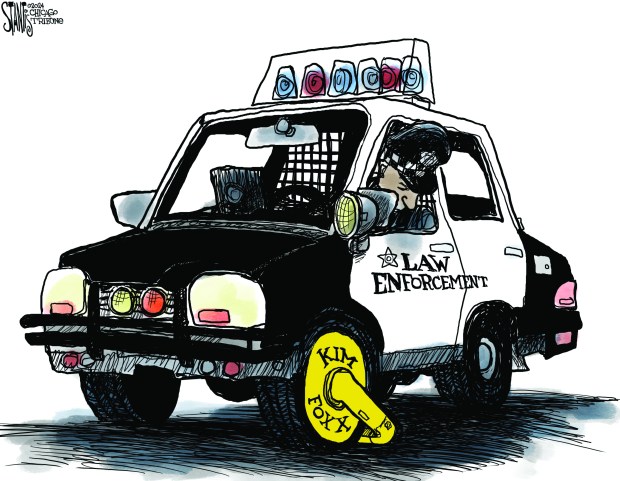Timothy McVeigh, otherwise known as the Oklahoma City bomber, was apprehended many miles away from his heinous crime by a police officer who had merely noticed a yellow Mercury was missing its registration tag. As he approached the driver, the officer noticed the bulge of a weapon under McVeigh’s jacket.
That was years ago, but in everyday Chicago, police view traffic stops as a crucial way of getting dangerous guns off the streets. The documented examples are numerous: a Glock 22 found after a stop for nonfunctional lights; a 9 mm Taurus found after officers noticed a driver going the wrong way down a one-way street; a loaded Ruger found in a car with expired license plates; a KAL-TEC handgun found after police officers noticed a driver blowing through a stop sign.
All of those examples, and we have seen reports of numerous others, represent good reasons why Cook County State’s Attorney Kim Foxx’s widely reported plan to decline to prosecute gun and drug possession crimes discovered as a result of minor traffic stops, such as the ones listed above, is a terrible idea. In a city that is not awash with gangs totting illegal guns, maybe. But that is not the situation in which Chicago finds itself.
Anyone even passingly familiar with the prevalence of drive-by shootings knows that a gun in a glove box is a gun that might well be the weapon in a pending violent crime. If officers are effectively prohibited from looking for these weapons, more people will die. It’s that simple.
Foxx’s argument is that traffic stops disproportionately target Chicagoans of color and rarely lead to arrests. To which we would answer, the violent crime that results from all these guns under seats and in glove boxes also disproportionately targets Chicagoans of color. Most folks living in neighborhoods beset by violent crime want as many guns apprehended and off the streets as possible, whether or not arrests accompany them.
It’s true that traffic stops can be so stressful for all parties that they may have unintended consequences or even cause needless deaths. As we noted in the recent case of Dexter Reed, police should have been reminded by what happened in that instance of the value of cool, calm heads and an awareness of the possibility of a mentally troubled suspect being triggered by officers approaching like this was a military-style assault. You can believe that Reed should not have discharged his weapon and that the police were justified in returning fire and still hope that police leaders now look more closely at what happens in traffic stops and train officers to be more aware of the risk factors of different approaches, both for citizens and for officers.
But that’s a police matter, subject to the nuance of different situations and case-by-case decisions, and it should not be subject to some will-not-prosecute edict from the Cook County state’s attorney. In fact, police Superintendent Larry Snelling has publicly said more than once that the department is de-emphasizing pre-textual traffic stops. Foxx’s move amounts to highly inappropriate meddling in policing by an official elected ostensibly to prosecute crimes, not catch the criminals.
It’s especially inappropriate in the case of a prosecutor whose term is almost over and who chose not to stand for reelection.
When voters picked Eileen O’Neill Burke for Cook County state’s attorney in the Democratic primary over a candidate Foxx endorsed, they were rejecting precisely these kinds of approaches. We’d assume that the new boss, whether Burke or Republican nominee Bob Fioretti, would promptly nix this policy along with several others in that office as soon as they are in place. In most offices, outgoing chief executives don’t execute drastic policy shifts in their waning days, but rather focus on keeping things functioning and effective while allowing their successors to set their own course. That is what should be happening here.
Given the timing, Foxx’s moves look to us largely symbolic and focused on where she might land next. That said, we don’t doubt the sincerity of her belief that traffic stops often create needlessly negative interactions. We acknowledge that her draft policy would still allow for some prosecutorial discretion. And we share Foxx’s belief that traffic stops should not target particular persons or neighborhoods. We’ll further emphasize that we are talking here about guns, not a baggie of marijuana.
But when a prosecutor makes these kinds of public statements undermining police officers and refusing potential prosecutions, it inevitably sends a signal to bad actors that they can operate with more impunity. Before Foxx took office seven years ago, the question of which crimes were not worth prosecuting was not made public, thus preserving a disincentive for breaking any law. As word gets out that you won’t be prosecuted for a gun offense if police stop you for a “minor” driving offense, wrongdoers have more incentive to bring that weapon along and maybe even use it in a fit of pique, fear or revenge.
Just as we see the benefit of the controversial ShotSpotter technology as more about saving the lives of victims than making arrests, so we see the data in the matter of guns as always open to interpretation, not least because it does not reflect the possibility of future crimes. We don’t know if one of those guns removed from a glove compartment after a traffic stop will be used in a drive-by shooting the following week, which might then trigger another drive-by as the next day’s revenge killing. How can we know if the stop never happens because officers see no point?
So with all due respect to the outgoing state’s attorney, we think she should let the police do their job when it comes to getting more guns off this city’s streets.
Submit a letter, of no more than 400 words, to the editor here or email letters@chicagotribune.com.



